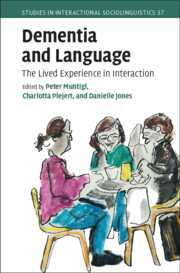Book contents
- Dementia and Language
- Studies in Interactional Sociolinguistics
- Dementia and Language
- Copyright page
- Contents
- Figures
- Tables
- Contributors
- Transcript notation key
- Part 1 Introduction
- Part 2 Dementia and Diagnostics
- Part 3 Dementia and Conversational Strategies
- 5 Using “Now What” to Discursively Compensate for Frontotemporal Dementia-related Challenges: A Longitudinal Case Study
- 6 Being Sociable
- 7 On the Use of Tag Questions by Co-participants of People with Dementia
- 8 Initiating and Pursuing a Topical Agenda with Limited Communicative Resources
- Part 4 Dementia and Epistemics
- Part 5 Communicative Challenges in Everyday Social Life
- Index
- References
7 - On the Use of Tag Questions by Co-participants of People with Dementia
Asymmetries of Knowledge, Power and Interactional Competence
from Part 3 - Dementia and Conversational Strategies
Published online by Cambridge University Press: 21 November 2024
- Dementia and Language
- Studies in Interactional Sociolinguistics
- Dementia and Language
- Copyright page
- Contents
- Figures
- Tables
- Contributors
- Transcript notation key
- Part 1 Introduction
- Part 2 Dementia and Diagnostics
- Part 3 Dementia and Conversational Strategies
- 5 Using “Now What” to Discursively Compensate for Frontotemporal Dementia-related Challenges: A Longitudinal Case Study
- 6 Being Sociable
- 7 On the Use of Tag Questions by Co-participants of People with Dementia
- 8 Initiating and Pursuing a Topical Agenda with Limited Communicative Resources
- Part 4 Dementia and Epistemics
- Part 5 Communicative Challenges in Everyday Social Life
- Index
- References
Summary
In this chapter we use conversation analysis to analyse the use of tag questions by co-participants of people with dementia. Tag questions can function as a ‘current speaker selects next’ technique. They also prefer, and hence put interactional pressure on, the next speaker to produce a response that aligns with the tag-formatted turn. We examine three classes of co-participant-produced tag-formatted actions and analyse how their use is recipient-designed for people with dementia. Tag-formatted assertions and assessments present information that the person with dementia has already been told or might be expected to know, while simultaneously acknowledging that this information is, or should be, within the recipient’s epistemic domain. By eliciting agreement, they co-opt the person with dementia into the co-construction of this topical talk. Tag-formatted challenges are produced in response to an inappropriate turn by the person with dementia and, as well as challenging/complaining about that turn, act to elicit from the person with dementia an acknowledgement of its inappropriacy. We then show how tag questions are used to induce verbal acquiescence to a suggested activity. We discuss how these tag questions encroach into the person with dementia’s territories of knowledge, power and interactional competence, highlighting asymmetries between the person with dementia and the co-participant in these domains.
- Type
- Chapter
- Information
- Dementia and LanguageThe Lived Experience in Interaction, pp. 151 - 174Publisher: Cambridge University PressPrint publication year: 2024

